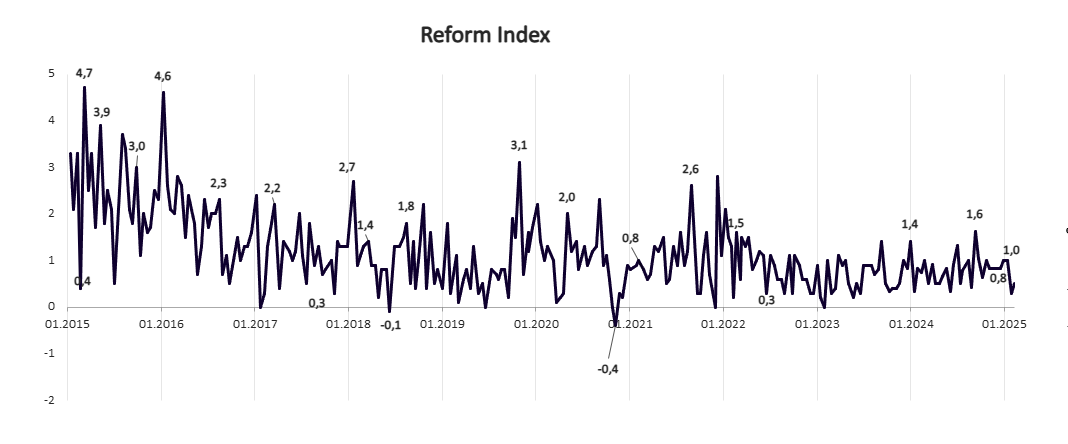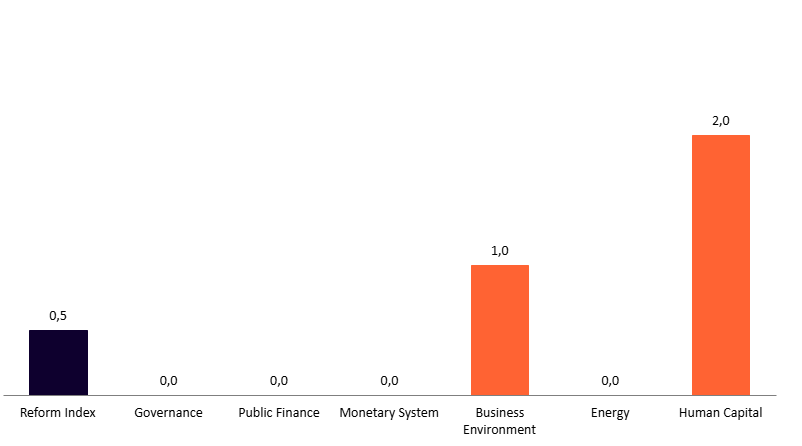Between January 27 and February 9, we recorded five reforms, each earning a score of +1 point. Round 257 highlights two of them: the automation of construction document reviews and the law on the certification of psychologists. The overall Reform Index score for Round 257 is 0.5 points, up from 0.3 in the previous round.
Graph 1. Dynamics of the Reform Index

Graph 2. Values of the Reform Index and its Components in the Current Assessment Round

Construction documents to be reviewed by an electronic system, +1 point
As of February 5, decisions on the construction of small residential buildings and auxiliary structures will be made by an electronic system without the involvement of public officials. This is expected to accelerate the permitting process. The system will now automatically monitor submissions and detect methodological or technical errors in the documents.
Automatic registration, previously available only via the Diia app, is now accessible to individuals submitting documents through Administrative Services Centers (ASCs).
Information about the Reforms Index project, the list of Index experts and the database of the regulations assessed are available here.
Expert commentary
Olena Pitirimova, Architect
“First and foremost, Cabinet Resolution No. 117 of February 4, 2025, clarifies and supplements the existing digitalized system in the construction sector. One important innovation is the specification that Class CC1 construction projects must comply with the functional zoning and designated land use of the plot.
Another key change concerns the procedure for assigning addresses to real estate objects. From now on, documents submitted via ASCs will be transmitted to the address-assignment authority exclusively through user accounts in the Unified State Electronic System in the Construction Sector (USESCS). Once the application is reviewed, the decision is returned through the same system, and ASC staff prints the electronic results for applicants. This eliminates the need for physical paperwork and speeds up the delivery of administrative services.
At the same time, certain provisions raise practical concerns. The regulation states that “documents for the commissioning of completed construction projects submitted in electronic form must be in a format suitable for content perception.” However, it does not clearly define what that format entails. A more specific definition would help avoid ambiguity. The resolution also introduces random selection — one in ten declarations will be checked for errors. However, a fully automated review of all declarations would be a more effective approach to minimizing systemic errors.
Despite the positive changes, digitalization in the construction sector still carries certain risks. One such risk is the inconsistency between state building codes (DBN) and relevant government resolutions or other legislative acts. This can lead to discrepancies between project design and commissioning, making it challenging to apply the standards in practice. In many populated areas, up-to-date urban planning documentation is still lacking, which creates obstacles to project approval. Another persistent challenge is the mismatch between the designated purpose of land plots and the actual buildings constructed on them, which can hinder or even block the legalization of such structures. In addition, not all communities maintain an address register, which may delay the automation of address assignment processes.
That said, it’s important that the digital transformation continues. Gradually addressing these issues will contribute to greater transparency, efficiency, and convenience in the construction sector.”
Mental health protection law, +1 point
Ukraine will introduce certification for psychologists and psychotherapists to ensure citizens have access to qualified mental health professionals. Certification will remain voluntary until 2031, after which it will become mandatory. Information about certified specialists will be included in the Registry of Mental Health Service Providers.
Certification will be administered by a newly established National Commission on Mental Health, operating under the Cabinet of Ministers. The commission will include representatives delegated by ministries, as well as members of self-regulatory organizations, civil society groups, and mental health experts.
The Cabinet of Ministers will define the certification procedure, but psychologists must first meet a set of formal requirements to be eligible. These include holding a higher education degree in the field, completing a theoretical course on the fundamentals of mental disorders, and providing certificates confirming ongoing professional development. Psychotherapists will be certified by internationally recognized self-regulatory organizations accredited by the National Commission. To qualify, they must hold at least a master’s degree in psychology, be trained in an internationally recognized therapeutic method, and provide documentation of continuous professional education.
The law also provides for the creation of national and local mental health programs, along with targeted initiatives — such as support networks, psychosocial support programs, and dedicated spaces — for children, youth, service members, veterans, and internally displaced persons. In addition, it encourages employers to develop workplace mental health support programs for their employees.
Expert commentary
Zamira Saidova, Ukrainian Association of Psychologists
“On January 15, the Law”On the Mental Health System in Ukraine” was adopted. Its goal is to bring the country’s wide-ranging and often fragmented psychological services under a unified standard and to finally establish clear boundaries that all practitioners must observe.
The law aims to provide safeguards for both service providers (psychologists and psychotherapists) and their clients by setting professional entry requirements. For clients, this minimizes the risk of seeking help from individuals without proper education or even minimal accountability to the professional community. For psychologists, the standards offer a structured path for planning their education and career and help them avoid issues with regulatory bodies — since, under the law, professionals must either register as sole proprietors or operate through legal entities. Choosing a specialization will now mean becoming part of a truly professional community rather than falling prey to fraudulent training schemes.
That said, the law is not without blind spots. Concerns remain regarding the certification process, the establishment of a national registry of psychological service providers, and the recognition of self-regulatory organizations — which must undergo international accreditation. Will this lead to monopolization of the market? Could continuing education become a money-making scheme for providers? How transparent will the certification and international accreditation processes really be? There are also lingering concerns about potential corruption within the National Mental Health Commission, which will be responsible for certifying professionals and maintaining the registry of self-regulatory bodies in the mental health field.
We’ll only get answers to these questions over time — once all the necessary implementing regulations are developed and the quality of their enforcement becomes clear”.
Reform Index from VoxUkraine aims to provide a comprehensive assessment of reform efforts by Ukraine’s authorities. The Index is based on expert assessments of changes in the regulatory environment in six areas: Governance, Public Finance, Monetary system, Business Environment, Energy, Human Capital. Information about the Reforms Index project, the list of Index experts and the database of the regulations assessed are available here.
Attention
The author doesn`t work for, consult to, own shares in or receive funding from any company or organization that would benefit from this article, and have no relevant affiliations



